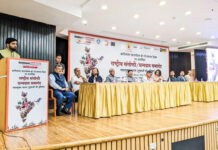New Delhi: The Council of Scientific and Industrial Research’s Bhopal-based Advanced Materials and Processes Research Institute (CSIR-AMPRI) has set up a new Centre for Advanced Radiation Shielding and Geopolymeric Materials and a new Analytical High Resolution Transmission Electron Microscope Laboratory.
The new Centre for Advanced Radiation Shielding and Geopolymeric Materials has been set up to take forward the research and development being carried out in the institute in the two important areas. Over the years, the institute has developed several materials for shielding against X-Ray and Gamma and Neutron radiation with application in various sectors ranging from medical diagnostic centres to nuclear power plants.
The new Analytical High Resolution Transmission Electron Microscope Laboratory, in turn, would help enhance the capacity of CSIR-AMPRI and neighboring institutes of Madhya Pradesh to carry out innovative research on advanced materials. Transmission Electron Microscope (TEM) provides for making measurements at finest length scales. A large number of researchers and students at CSIR-AMPRI and in the nearby regions of Bhopal are, among other things, engaged in investigating the properties of diverse classes of materials.
Union Minister for Science and Technology, Earth Sciences and Health & Family Welfare, Dr. Harsh Vardhan inaugurated the two new facilities during a recent visit to the institute.
Speaking on the occasion, he noted that safe drinking water is required for everyone and CSIR-AMPRI is working in this direction and has given solutions to the problem of arsenic and fluoride. He also lauded the institute for successfully adopting the ‘Waste to Wealth’ strategy as it has developed radiation shielding materials utilizing industrial wastes as raw materials. He said that significantly, a novel process for making lead free and highly effective shielding materials useful for the construction of X-ray diagnostic and CT scanner rooms has been developed utilizing industrial waste namely red mud and fly ash.
The Minister further pointed out that it developed knowhow for sanitizers, face masks, and disinfectants to help fight the COVID-19 pandemic. Noting that its masks are available on Amazon too, he said it was in the forefront during the pandemic time by undertaking research problems in collaboration with AIIMS, Bhopal in the area of development of rapid electrochemical based diagnostic for detection of SARS-COV infection.
Referring to the new Centre for Advanced Radiation Shielding and Geopolymeric Materials, he noted that the advances in geopolymeric materials will accelerate strategic applications such as development of thermal resistant geopolymeric concrete for missile /rocket launching pads; geopolymeric bullet proof concrete for bunkers; graphene-induced geopolymeric concrete and geopolymeric radiation shielding concrete. In addition, it will have advanced conventional applications such as development and up scaling of ready mix geopolymeric concrete for road applications and structural applications; roller-compacted geopolymeric concrete; and pre-stressed geopolymeric concrete components.
He also laid the foundation stone for a bamboo composite structure at the institute. It has developed a knowhow of manufacturing environmentally friendly multifunctional bamboo composite material for modern housing and structures using abundantly available bamboo as a raw material. It can serve as a competitive, sustainable and environment friendly alternative material, useful in the construction of smart green buildings as it has very attractive features like, aesthetic appearance, acoustic & thermal insulation. Patents have also been filed on this know-how and also transferred to M/s Permali Wallace private limited. Dr Harsh Vardhan noted that this will be advantageous to the bamboo cultivators located in various parts of India and also help in the generation of employment. (India Science Wire)











